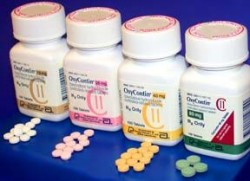Oxycodone Addiction
The Watershed Addiction Treatment Programs
The Watershed of the Palm Beaches is licensed by the State of Florida and “Gold Seal” accredited by The Joint Commission for alcohol and drug treatment. This symbolizes value and illumines the dedication to meeting industry performance standards. We are a world-class health care facility that offers professional addiction treatment. Just two miles from beautiful Palm Beach County beaches, our rehabilitation center is the perfect setting to emerge refreshed and renewed.
Read More ›Oxycodone is a semi-synthetic opiate that is commonly prescribed to patients that suffer from chronic pain. It can also be prescribed following a surgical procedure or injury. In small, moderate doses, Oxycodone is helpful at treating moderate to sever pain, but when it is taken repeatedly or for more than a few days, tolerance and physical dependence quickly begin to set in. Oxycodone addiction can be the result of being prescribed the medication or it may result from using the drug for recreational purposes—regardless of how it begins, Oxycodone addiction often requires treatment and support for the user to quit.
What is Oxycodone?
According to the Center for Substance Abuse Research, “Oxycodone is a semi-syhtentic opiate manufactured by modifying the chemical thebaine, an organic chemical found in opium.” Oxycodone is used in a number of prescription pain medications as the active ingredient including:

Oxycodone is a prescription narcotic that has very addictive properties.
- Percocet
- Percodan
- Tylox
Oxycodone is available in various doses ranging from 10 milligrams to 80 milligrams. It is usually mixed with aspirin when it is provided in the form of Percocet or one of the other named brands.
How is Oxycodone Abused?
According to the National Drug Intelligence Center, Oxycodone, “is designed to be swallowed whole, however, abusers ingest the drug in a variety of ways.” Often times, Oxycodone abusers will chew the pills in order to feel near immediate effects. They also will crush and snort the tables. Oxycodone is water soluble; some users will crush and dissolve the tablets in water to be injected intravenously using a hypodermic needle.
Unfortunately, when oxycodone is injected or snorted, the dangers of overdose and serious complications are greatly increased. Rapid release of the drug can lead to respiratory failure, labored breathing, heart attack and death.
Effects of Oxycodone
Using Oxycodone will produce an array of effects. The side effects that a user experiences can be mild or they may be quite severe and even dangerous. Physically, the user will feel relaxed and have little to no pain, psychologically, there could will usually be euphoria and feelings of content and happiness.
The following side effects of Oxycodone may arise from even a single dose of the drug:
- headaches
- nausea or vomitting
- diarrhea
- constipation
- irregular breathing
- labored breathing
- respiratory depression
- seizures
- dizziness or confusion
- cardiac arrest
- changes in blood pressure
Signs of Oxycodone Abuse
If you suspect that your loved one may be abusing Oxycodone, seeking professional help right away may reduce the impact that the drug use has on the user’s life, but there are no guarantees. Pay close attention to the following signs of Oxycodone abuse:
- running out of a prescription before the deadline to fill the prescription
- asking the doctor for more Oxycodone when there is no legitimate need for the drug
- using Oxycodone to cope with emotional stress
- using Oxycodone as a way to escape stress
- using Oxycodone when there is no pain
- telling lies about Oxycodone use
- stealing oxycodone from a loved one or friend
- purchasing Oxycodone on the streets
- taking Oxycodone for fun
Fortunately, in the early stages, Oxycodone abuse can be pretty easily treated. As the abuse progresses into a situation in which the user becomes addicted, treatment can become more involved and much more serious. As such, it’s important to seek help early on whenever possible as this can defray some of the negative consequences and may reduce the need for long term treatment and care.
Signs of Oxycodone Addiction
One of the first, and most relevant signs of Oxycodone addiction is withdrawal. According to the University of Maryland Medical Center, opiate withdrawal includes an array of symptoms such as:
- nausea
- vomiting
- diarrhea
- agitation
- anxiety
- irritability
- sweating profusely
- itchy and watery eyes
- runny nose
- flu-symptoms
- stomach cramps
- sore muscles
- bone pain
- anxiety
In addition to the symptoms of withdrawal that are common in a user who has become addicted to Oxycodone, the following signs of addiction may also be present:
- inability to cope without Oxycodone
- feeling like there’s nothing more to life than Oxycodone
- doctor shopping in an effort to find and receive more drugs
- lying about drug use
- stealing to fuel an Oxycodone habit
- refusing to quit using Oxycodone despite negative consequences
- using Oxycodone even when such use has caused problems in health, relationships, financially, legally or in other aspects of the user’s life
- avoiding activities that do not involve drug use
- using Oxycodone as an escape
- being preoccupied with the need to find and use Oxycodone
- track marks or needle marks being present on the arms, legs, neck or other areas of the body
- having a lack of hygiene
- infections or sores resulting from intravenous drug use
- overdose resulting from excessive drug use
Treatment for Oxycodone Addiction
Supportive care, medical intervention and counseling are generally the chosen methods of treatment for patients suffering from oxycodone addiction. Detox is the first step, and often the most difficult to cope with. During this time, the user will abruptly quit taking Oxycodone or he or she will gradually be weaned off the drug in an effort to prevent serious withdrawal symptoms. Often times, medications are used to help eliminate cravings or reduce the symptoms of withdrawal. The most common medications used in the treatment of Oxycodone addiction include:
- Methadone
- Subutex
- Suboxone
- Buprenorphine
- Naltrexone
- Clonidine
- Acomprosate
Dangers of Rapid Detox
Some treatment programs tout the ability to actively reduce withdrawal symptoms within a period of 48 hours or less. These “rapid detox” programs are highly controversial and can be very dangerous to the user. According to the University of Maryland Medical Center, “such programs involve placing you under anesthesia and injecting large doses of opiate-blocking drugs, with hopes that this will speed up the return the body to normal opioid system function.” Unfortunately, there is no guarantee that this type of treatment works or that it can be safe for the user.
Support Groups for Oxycodone Addiction
Support will provide the majority of the assistance for the user in recovery from Oxycodone addiction. Each patient is different and the type of support that is most effective will vary much like the user’s vary. Some of the most common support groups that can help those who are in recovery from Oxycodone addiction include:
- Narcotics Anonymous
- SMART Recovery
- other anonymous groups
Recovery from Oxycodone Addiction
The length of time that it takes for you to recover, the steps that you take to recover and how difficult it is for you to get your life back on track will depend on a variety of factors including:
- how long you have been addicted to oxycodone
- how committed you are to getting well
- how much time you spend in treatment
- how focused you are on treatment
- whether you have any other health problems
- whether you have been using drugs for a very long time
- whether you use other drugs or alcohol
Recovery will be an uphill journey and you may find that there are many bumps in the road but the reward is your sobriety and your health. If you think that you can’t do it, don’t be afraid to seek professional help! There are so many methods of treatment that are now readily available to assist people just like you in finding and achieving full recovery from Oxycodone addiction. Just stay committed, stay focused and get the supportive help that you need to get sober today.



